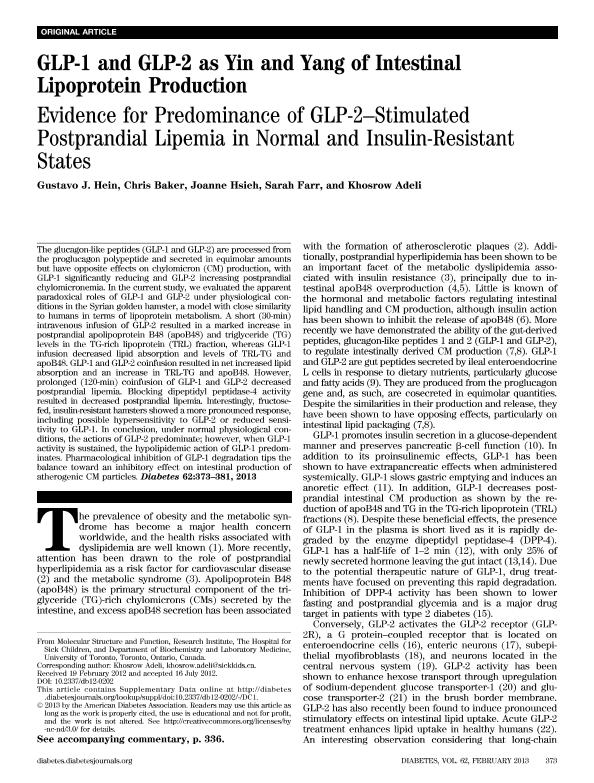Artículo
GLP-1 and GLP-2 as Ying and Yang of Intestinal Lipoprotein Production: Evidence for predominance of GLP-2-stimulated postprandial lipemia in normal and insulin Resistant States
Fecha de publicación:
06/2013
Editorial:
American Diabetes Association
Revista:
Diabetes
ISSN:
0012-1797
Idioma:
Inglés
Tipo de recurso:
Artículo publicado
Clasificación temática:
Resumen
The glucagon-like peptides (GLP-1 and GLP-2) are processed from the proglucagon polypeptide and secreted in equimolar amounts but have opposite effects on chylomicron (CM) production, with GLP-1 significantly reducing and GLP-2 increasing postprandial chylomicronemia. In the current study, we evaluated the apparent paradoxical roles of GLP-1 and GLP-2 under physiological conditions in the Syrian golden hamster, a model with close similarity to humans in terms of lipoprotein metabolism. A short (30-min) intravenous infusion of GLP-2 resulted in a marked increase in postprandial apolipoprotein B48 (apoB48) and triglyceride (TG) levels in the TG-rich lipoprotein (TRL) fraction, whereas GLP-1 infusion decreased lipid absorption and levels of TRL-TG and apoB48. GLP-1 and GLP-2 coinfusion resulted in net increased lipid absorption and an increase in TRL-TG and apoB48. However, prolonged (120-min) coinfusion of GLP-1 and GLP-2 decreased postprandial lipemia. Blocking dipeptidyl peptidase-4 activity resulted in decreased postprandial lipemia. Interestingly, fructose-fed, insulin-resistant hamsters showed a more pronounced response, including possible hypersensitivity to GLP-2 or reduced sensitivity to GLP-1. In conclusion, under normal physiological conditions, the actions of GLP-2 predominate; however, when GLP-1 activity is sustained, the hypolipidemic action of GLP-1 predominates. Pharmacological inhibition of GLP-1 degradation tips the balance toward an inhibitory effect on intestinal production of atherogenic CM particles.
Archivos asociados
Licencia
Identificadores
Colecciones
Articulos(CCT - SANTA FE)
Articulos de CTRO.CIENTIFICO TECNOL.CONICET - SANTA FE
Articulos de CTRO.CIENTIFICO TECNOL.CONICET - SANTA FE
Citación
Hein, Gustavo Juan; Baker, Chris; Hsieh, Joanne; Farr, Sara; Khosrow, Adeli; GLP-1 and GLP-2 as Ying and Yang of Intestinal Lipoprotein Production: Evidence for predominance of GLP-2-stimulated postprandial lipemia in normal and insulin Resistant States; American Diabetes Association; Diabetes; 62; 2; 6-2013; 373-381
Compartir
Altmétricas




